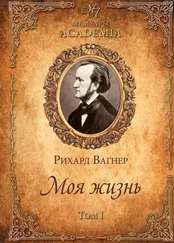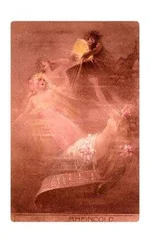Рихард Вагнер - My Life. Volume 2
Здесь есть возможность читать онлайн «Рихард Вагнер - My Life. Volume 2» — ознакомительный отрывок электронной книги совершенно бесплатно, а после прочтения отрывка купить полную версию. В некоторых случаях можно слушать аудио, скачать через торрент в формате fb2 и присутствует краткое содержание. Жанр: Биографии и Мемуары, foreign_home, music_dancing, music_dancing, foreign_antique, на английском языке. Описание произведения, (предисловие) а так же отзывы посетителей доступны на портале библиотеки ЛибКат.
- Название:My Life. Volume 2
- Автор:
- Жанр:
- Год:неизвестен
- ISBN:нет данных
- Рейтинг книги:3 / 5. Голосов: 1
-
Избранное:Добавить в избранное
- Отзывы:
-
Ваша оценка:
- 60
- 1
- 2
- 3
- 4
- 5
My Life. Volume 2: краткое содержание, описание и аннотация
Предлагаем к чтению аннотацию, описание, краткое содержание или предисловие (зависит от того, что написал сам автор книги «My Life. Volume 2»). Если вы не нашли необходимую информацию о книге — напишите в комментариях, мы постараемся отыскать её.
My Life. Volume 2 — читать онлайн ознакомительный отрывок
Ниже представлен текст книги, разбитый по страницам. Система сохранения места последней прочитанной страницы, позволяет с удобством читать онлайн бесплатно книгу «My Life. Volume 2», без необходимости каждый раз заново искать на чём Вы остановились. Поставьте закладку, и сможете в любой момент перейти на страницу, на которой закончили чтение.
Интервал:
Закладка:
Richard Wagner
My Life – Volume 2
PART III
1850-1861
MINNA had been lucky enough to find quarters near Zurich which corresponded very closely with the wishes I had so emphatically expressed before leaving. The house was situated in the parish of Enge, a good fifteen minutes' walk from the town, on a site overlooking the lake, and was an old-fashioned hostelry called 'Zum Abendstern,' belonging to a certain Frau Hirel, who was a pleasant old lady. The second floor, which was quite self-contained and very quiet, offered us humble but adequate accommodations for a modest rent.
I arrived early in the morning and found Minna still in bed. She was anxious to know whether I had returned simply out of pity; but I quickly succeeded in obtaining her promise that she would never again refer to what had taken place. She was soon quite herself again when she began to show me the progress she had made in arranging the rooms.
Our position had for some years been growing more comfortable, in spite of the fact that at this time various difficulties again arose, and our domestic happiness seemed tolerably secure. Yet I could never quite master a restless inclination to deviate from anything that was regarded as conventional.
Our two pets, Peps and Papo, largely helped to make our lodgings homelike; both were very fond of me, and were sometimes even too obtrusive in showing their affection. Peps would always lie behind me in the armchair while I was working, and Papo, after repeatedly calling out 'Richard' in vain, would often come fluttering into my study if I stayed away from the sitting-room too long. He would then settle down on my desk and vigorously shuffle about the papers and pens. He was so well trained that he never uttered the ordinary cry of a bird, but expressed his sentiments only by talking or singing. As soon as he heard my step on the staircase he would begin whistling a tune, as, for instance, the great march in the finale of the Symphony in C minor, the beginning of the Eighth Symphony in F major, or even a bright bit out of the Rienzi Overture. Peps, our little dog, on the other hand, was a highly sensitive and nervous creature. My friends used to call him 'Peps the petulant,' and there were times when we could not speak to him even in the friendliest way without bringing on paroxysms of howls and sobs. These two pets of course helped very much to increase the mutual understanding between myself and my wife.
Unfortunately, there was one perpetual source of quarrel, arising from my wife's behaviour towards poor Nathalie. Until her death she shamefully withheld from the girl the fact that she was her mother. Nathalie, therefore, always believed that she was Minna's sister, and consequently could not understand why she should not have the same rights as my wife, who always treated her in an authoritative way, as a strict mother would do, and seemed to think herself justified in complaining of Nathalie's behaviour. Apparently the latter had been much neglected and spoiled just at the critical age, and deprived of any proper training. She was short in stature and inclined to become stout, her manners were awkward and her opinions narrow. Minna's hasty temper and continual jeering made the girl, who was naturally very good-natured, stubborn and spiteful, so that the behaviour of the 'sisters' often caused the most hateful scenes in our quiet home. I never lost my patience at these incidents, however, but remained, completely indifferent to everything going on around me.
The arrival of my young friend Karl was a pleasant diversion in our small household. Ho occupied a tiny attic above our rooms and shared our meals. Sometimes he would accompany me on my walks, and for a time seemed quite satisfied.
But I soon noticed in him a growing restlessness. He had not been slow to recognise, by the unpleasant scenes that again became daily occurrences in our married life, at what point the shoe pinched that I had good-naturedly put on again at his request. However, when one day I reminded him that in coming hack to Zurich I had other objects in view besides the longing for a quiet domestic life, he remained silent. But I saw that there was another peculiar reason for his uneasiness; he took to coming in late for meals, and even then he had no appetite. At first I was anxious at this, fearing he might have taken a dislike to our simple fare, but I soon discovered that my young friend was so passionately addicted to sweets that I feared he might eventually ruin his health by trying to live on large quantities of confectionery. My remarks seemed to annoy him, as his absences from the house became more frequent, I thought that probably his small room did not afford him the comfort he required, and I therefore made no objection when he left us and took a room in town.
As his state of uneasiness still seemed to increase and he did not appear at all happy in Zurich, I was glad to be able to suggest a little change for him, and persuade him to go for a holiday to Weimar, where the first performance of Lohengrin was to take place about the end of August.
About the same time I induced Minna to go with me for our first ascent of the Righi, a feat we both accomplished very energetically on foot. I was very much grieved on this occasion to discover that my wife had symptoms of heart disease, which continued to develop subsequently. We spent the evening of the 28th of August, while the first performance of Lohengrin was taking place at Weimar, in Lucerne, at the Schwan inn, watching the clock as the hands went round, and marking the various times at which the performance presumably began, developed, and came to a close.
I always felt somewhat distressed, uncomfortable, and ill at ease whenever I tried to pass a few pleasant hours in the society of my wife.
The reports received of that first performance gave me no clear or reassuring impression of it. Karl Ritter soon came back to Zurich, and told me of deficiencies in staging and of the unfortunate choice of a singer for the leading part, but remarked that on the whole it had gone fairly well. The reports sent me by Liszt were the most encouraging. He did not seem to think it worth while to allude to the inadequacy of the means at his command for such a bold undertaking, but preferred to dwell on the sympathetic spirit that prevailed in the company and the effect it produced on the influential personages he had invited to be present.
Although everything in connection with this important enterprise eventually assumed a bright aspect, the direct result on my position at the time was very slight. I was more interested in the future of the young friend who had been entrusted to my care than in anything else. At the time of his visit to Weimar he had been to stay with his family in Dresden, and after his return expressed an anxious wish to become a musician, and possibly to secure a position as a musical director at a theatre. I had never had an opportunity of judging of his gifts in this line. He had always refused to play the piano in my presence, but I had seen his setting of an alliterative poem of his own, Die Walkure, which, though rather awkwardly put together, struck me by its precise and skilful compliance with the rules of composition.
He proved himself to be the worthy pupil of his master, Robert Schumann, who, long before, had told me that Karl possessed great musical gifts, and that he could not remember ever having had any other pupil endowed with such a keen ear and such a ready facility for assimilation. Consequently I had no reason to discourage the young man's confidence in his capacity for the career of a musical director. As the winter season was approaching, I asked the manager of the theatre for the address of Herr Kramer, who was coming for the season, and learned that he was still engaged at Winterthur.
Читать дальшеИнтервал:
Закладка:
Похожие книги на «My Life. Volume 2»
Представляем Вашему вниманию похожие книги на «My Life. Volume 2» списком для выбора. Мы отобрали схожую по названию и смыслу литературу в надежде предоставить читателям больше вариантов отыскать новые, интересные, ещё непрочитанные произведения.
Обсуждение, отзывы о книге «My Life. Volume 2» и просто собственные мнения читателей. Оставьте ваши комментарии, напишите, что Вы думаете о произведении, его смысле или главных героях. Укажите что конкретно понравилось, а что нет, и почему Вы так считаете.










